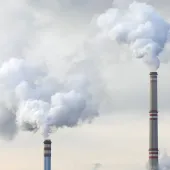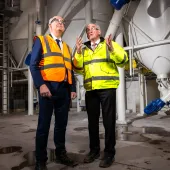Cement industry calls for government support to hit Net Zero
At COP29 in Baku, the Global Cement and Concrete Association (GCCA) is calling for governments worldwide to ramp up their policy support to help the cement industry achieve its decarbonisation targets. The industry is tackling CO₂ emissions and sustainable energy use, but GCCA leaders say government action is essential to fully unlock progress toward net zero.
The GCCA’s Cement Industry Net Zero Progress Report 2024/25, launched at the conference, highlights the strides made by cement companies since the GCCA’s Concrete Future 2050 Roadmap was introduced three years ago. It also showcases projects in carbon capture, alternative energy, and sustainable material use, aimed at reducing the industry’s environmental impact.
GCCA president Fernando González, CEO of Cemex, emphasises the need for a collaborative approach: “Our industry is engaged in the most significant transformation in its history, but to fully unlock our decarbonisation progress in this crucial decade, we urgently need effective policy support. When policymakers provide the right market conditions, significant CO₂ reductions are achievable faster.”
The report calls for policies promoting the use of municipal and industrial waste as fuel, recycled raw materials from construction demolition, and updated building codes that encourage lower-carbon cement options. It also pushes for carbon pricing mechanisms that would incentivise clean innovation and investment.
Thomas Guillot, chief executive of the GCCA, underscores the importance of collaborative efforts: “This report shows several great examples of action happening worldwide, demonstrating that acceleration of our decarbonisation efforts is possible when enabling policies exist. That’s why we are here at COP29, calling on all policymakers to urgently work with us on our net zero mission.”
The report includes case studies showing projects from across the globe, including:
- Carbon Capture and Storage (CCUS): This technology is a primary decarbonisation method, accounting for 36% of planned CO₂ reductions in the GCCA’s roadmap. Heidelberg Materials’ plant in Brevik, Norway, set for completion at the end of 2024, aims to capture CO₂ at source, producing net-zero cement.
- Alternative Energy: Increased use of solar energy by companies like Breedon in Ireland and TITAN Cement in Bulgaria shows how renewable energy is being integrated into cement production.
- Sustainable Fuels and Circular Economy: Cemex, working with Queretaro, Mexico, supports the country’s first zero-waste-to-landfill initiative, while companies like JSW Cement in India make use of non-recyclable waste as fuel.
The GCCA is working closely with organisations and governments worldwide to enable more climate-resilient practices within the cement sector.







